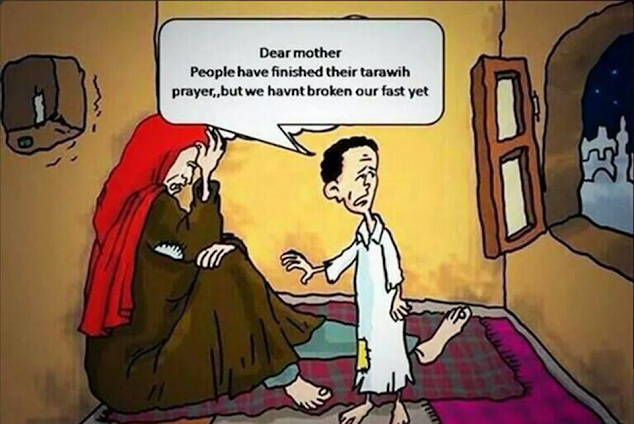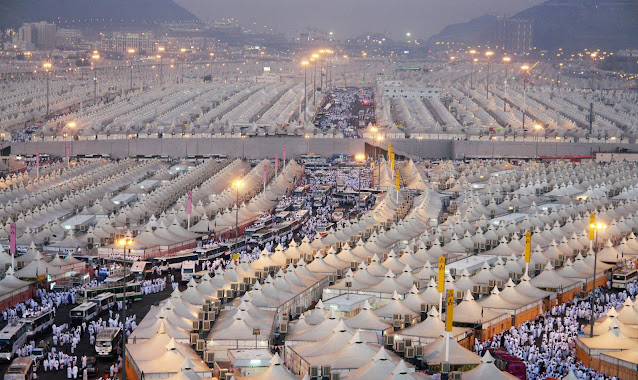Al-Jumuah - Friday?
Part of any calendar elements, are the weeks and the days, that form the basic units of the calendar months. In this post, we would like to focus on this basic premise that forms the basic scheme of the Hijra Calendar, that distinguish a particular day as religiously significant from the other. This is to pose the question whether Friday is a holier day and preferred by God than any other days.
Holy days
The Christians named Sunday as their holy day while The Jews will have their Sabbath on Saturday. It was said that during the pre-Islamic period, Friday became the market day as both the Jews and the Christians will have their inactivity during the weekend and Friday would be their market day for them to get all their supplies. The market day became the congregation day of the people waiting for merchandise, buying supplies and participate in the social activity and entertainment.
In this post, we will explore as whether Friday, has any correlations with Surah 62 of the Quran : Al-Jumu’a, traditionally known as the day of congregation. In short, Surah of Al-Jumu’a is a reminder for us to respond to the Salat when it is called during the day of congregation and not to be distracted by all the transaction activities, which was the market itself.
Artist's depiction of ancient Middle East market day
In this context, we can see that Friday or Jumu’a, was just a market day by default based on circumstances already determined by the Christians and the Jews. The pre-Islamic Arabs were already using the 7-day week cycle as the Jews and the Christians. Largely because of the Roman influence over the region and Christianity was already the predominant religion sanctioned under the Eastern Roman empire (The Byzantine).
How the 7-day week evolved
Ancient civilizations had experimented with many configurations of counting days. The 7-day week cycle was the most common and was obviously developed from the 4 moon phases, each taking approximately 7.4 days and the complete lunar cycle in 29.53 days. Of course the present calendar weeks are no longer following the phases of the moon, becoming arbitrary and independent of the moon phases. The week had become an independent measuring cycle of days, not even relating to any moon phases.
The Babylonian used to adopt intercalary days to synchronize their 7-day week with the new moon. The Jews later had adopted the same 7-day week and removed the connections with the moon phases, making the week days as simply random and arbitrary. This means we cannot pinpoint a particular day having any particular significance. Whether it’s Sunday, Saturday, or Friday. God has nothing to do with making any of these days holy.
The Arabic 7-day week
Similarly, the Arabic days had existed side by side with the Jewish and Christian weekdays. Whether it’s Arabic, Jewish or Christian, none can proof or trace any significance of the holy days determined by each particular religion.
When was the starting point of the calendars? When was Day One?
622CE? 1CE?
2000 BC?
The Ice Age?
Jurassic period?
Paleozoic Period?
The Big Bang?
So who keeps track of the days of the week from ages ago?
And let God make His choices?
Friday / Al-Jum’ah
The Arabic weekdays were named by numbering sequence, except for Friday, the sixth day. God did not name it Friday as Al-Jumu’a. Friday was named by Kaab bin Luay, 300 years before Muhammad’s prophethood. Al-Jum’ah was previously called Al-‘Arūbah, but was changed by Kaab bin Luay because he was preaching on this day.
According to accord. to the “Rowḍ” (“Er-Rowḍ el-Unuf”) of Es-Suheylee :, Kaab Ibn-Lu-eí was the first who collected a congregation on the day of العروبة, which was not called الجمعة save since the coming of El-Islám; [or it was not generally thus called before El-Islám; for it is added,] and he was the first who named it الجمعة; for Kureysh used to congregate to him on this day, and he used to preach to them, and to put them in mind of the mission of the apostle of God, informing them that he should be of his descendants, and bidding them to follow him and to believe in him:
From the above, it was said Kaab bin Luay had change the name of the congregation day from Al-‘Arūbah to Al-Jum’ah. Historically, there was nothing special, about this particular day apart from a day in which Kaab bin Luay conduct his preachings.
Kaab bin Luay was Prophet Muhammad great ancestors, over 7 generations - almost 300 years before the birth of the Prophet.
Friday / Jumu’a as a holy day
Surah Al-Jumu’a was not in reference to a day called Jum’ah or Friday. The subject matter of the Surah is much larger, than about calling people to perform a weekly ritual prayer. This means that Allah did not select a particular day for specific ritual prayer, giving preferences against other days. Did Allah send a wahi to Kaab bin Luay to name Friday as Jumu’a Day? Because as far as the pre-Islamic Arabs were concerned, Friday was just a day of congregation / assembly, originally called Al-Aruba and later changed to Al-Jumu’a.
Instead of identifying Al-Jumu’a as an Islamic holy day that repeats 50 times throughout the Lunar calendar, we should ponder the context and the real message or reminder from the verse. Was the verse about a weekly reminder or something that closer to every man and women. Because Friday prayer is predominantly preserved for men.
Basic Meaning
There are two key words that we need to recognize their purposeful meanings, instead of the common denominations of the traditional narratives.
ayyāman : root word: Yā-Wāw-Mīm (ي و م).
يَوْمٌ - A time, whether night or day; (Miṣbah;) time absolutely, whether night or not, little or not: this is the proper signification: (Kulleeyat of Abu-l-Bakà, p. 390:) and day, meaning the period from the rising of the sun to its setting;
Also, An accident, or event; syn. كَوْنٌ and كَائِنَةٌ.
Ex., نِعْمَ ٱلْأَخُ فُلَانٌ فِى اليَوْمِ إِذَا نَزَلَ بِنَا
Excellent is the brother, such a one, in the case of the accident, when it befalls us. (Tahdheeb of El-Azheree.)
The word Jama’a : جَمَعَ
Generally means : He collected; brought, or gathered, together; gathered up; assembled; congregated; mustered; drew together; or contracted; (The “Mughrib” of El-Muṭarrizee, Er-Rághib, The “Ḳámoos.”)
a thing; (Er-Rághib, The “Miṣbáḥ” of El-Feiyoomee.)
so that the several parts or portions became near together; (Er-Rághib)
The word Jumu’ah : جُمْعَةٌ
signifies A state of union, agreement, congruity, or congregation: or sociableness, socialness, familiarity, companionableness, companionship, fellowship, friendship, and amity:
Surah Al-Jumu’a
Al-Jumu’ah in chapter 62 is a proper noun that was referring to a particular gathering or assembly. The assembly of people being referred, was perhaps the market place where people gather and flock to the caravans to purchase supplies, and with a little bit of entertainment.
yawmi l-jumuʿati is not about a particular week day, but is relating to an event where people congregate or assemble. And this concregation is not about performing a group prayer, but in the stated context of Al-Bay’a ( the business ) in verse 62:9.
The congregation is further supported by verse 62:11 where tijaratan (transactions) and lahwan (amusement) were mentioned as part of context.
But what most readers had missed in verse 62:9 is the word “min” yawmi l-jumuʿati.
The verse clearly says, the call for Salat is from the Day of Congregation. ( nūdiya lilṣṣalati min yawmi l-jumuʿati ).
It was not a call for prayer on Friday, or the day of congregation.
The congregation was clearly for business and transaction (al-bay’s & al-tijarati) and amusement (al-lahwi).
62:9 O you who had attained Emaan! when the call for salat from the Day of Congregation, then hasten to remembrance of Allah and leave off trading (al-bay’a); that is better for you, if you know
62:10 Then when concluded the salat, then disperse in the land and seek from Allah's grace, and remember Allah much, that you may be successful
62:11 And when they see a transaction or amusement, they rush over it, and leave you standing. Say: What is with Allah is better than amusement and transactions, and Allah is the best of Sustainers
To understand the Quranic term of salat, in this context, we must examine the Salat of Shuaib that has a similar context of doing business (11:84-88).
We have been told that the essence of Salat is to enjoin with the right [wa-mur bil-ma’rufi]
And forbid from the wrong, [wa-in’ha ‘ani l-munkari] (31:17)
So Shuaib had communicated with his community to enjoin with the right that is to fulfill the measurement and weight with justice, in their business (11:85).
Likewise, Shuaib had also conveyed his community to forbid the wrong, by not decreasing the measurement and the scale (11:84).
But all these communications to remind his people had fallen on deaf ears.
They do not want to abandon what had served them well in wealth, by deception in their transactions (11:87)
Despite Shuaib’s clear communications, his community cannot understand or comprehend what Shuaib has been communicating to them (11:91).
Back to verse 62:11, we can see the similar outcome to the call to enjoin with the right [wa-mur bil-ma’rufi], and to forbid from the wrong, [wa-in’ha ‘ani l-munkari] had been turned down by the attraction of the lucrative transactions and the amusement of pleasure from it.
In the context of our everyday life, we must always listen to these corrective calls, reform, or critique, as any injustice shall bring unfavourable consequences to the community, or falling of nations (11:89-90).
The congregation is no longer the marketplace, but the everyday retail business and market, covering all economic activities.
Al-Jumua refers to the elite group of people who controls the economy, in doing trade and business. They are not just businessmen, but include the elite politicians that work in tandem to secure the position of the elite business community.
This call is towards those in control, or in the monopoly of the economic market shares, whom are more preoccupied with their business profits (tijāratan) and entertaining themselves in their wealth (lahwan).
Very often the call towards the elite Jumua' to be mindful, equitable and fair, falls on deaf ear.
They control the politicians, the government and the whole economic chain that affects the ordinary people.
This call is also a call for transparency and against corruption of the system by the elites.
In the case of Shuaib's people, their way of exploiting the inequitable economic had serve them well to give tremendous wealth that they can no longer understand the message conveyed by Shuaib.
While Muslims in general perceived the Quranic Chaper Al-Jumua' as a call towards weekly ritual prayer, The countries that did well in the Islamicity Index have a more transparent and better performance in Economic Opportunity and Economic Freedom, Governance of Businesses, Freedom from Corruption, etc.
No doubt these countries also accommodate business elites, and not perfect, that some may be involve in discriminatory sanctions, but their governance constantly works towards transparency and fairness towards economic regulations.









Comments
Post a Comment